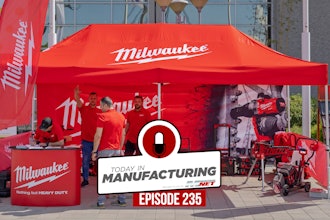|
"After the machines have been in the shop for awhile, it's nearly impossible to bring in a third party that knows the machine's quirks and history." -David Mantey |
Coming from a family filled with maintenance managers, leads and laborers, I’d be a fool to try and convince any operations manager that outsourcing maintenance tasks is the way to go. Not only would I sit down to a fiery roundtable next time I hit the family up for a free meal, but I would be potentially jeopardizing one of the few positions in a plant where workers stick around for longer than that eight month probationary period.
In my time as a college undergrad, I put in many hours during summer and winter breaks at QC tables sorting domes (a little piece of silicone that apparently played a role in soap dispensers) or sitting at a bench cleaning screws, and an innumerable amount of unnamed parts that were coated in half-cured silicone. Throughout my brief tenure at both of these posts, I watched press operators and sorters, among others, funnel through that shop like it was a stop on a twenty station obstacle course. I quickly learned that I didn’t need to know a first name until at least the second week.
The single thing that remained consistent on that shop floor, other than the presses, was the maintenance crew. Angel, Junior, Ito and my Pop were there throughout each of my stays and for all I know, they’re still there. Well I know Pop is still managing the force, but I didn’t exactly exchange phone numbers and e-mail addresses with the guys when I left.
With such a committed crew of workers, who have dedicated years of continued training and personal development to the company, why alienate their career paths? If they are happy in their work, comparatively satisfied with their compensation, and working towards becoming the best at their position as they vie for second- and third-shift lead positions, these employees should be nurtured, and rewarded for their commitment.
These are the people manning the machines on a daily basis, building a rapport with a sense of responsibility that is tested anytime the red light flashes and the operator waves them over. After the machines have been in the shop for awhile, it’s nearly impossible to bring in a third party that knows the machine’s quirks and history.
It’s like bringing your kid to the emergency room instead of his/her regular physician. The ER doc knows a quick fix based on the brief history provided and his/her general knowledge on healing, but a check up with a doc familiar with the subject matter is still recommended after the loose wires have been reconnected.
And think of the time, the time difference between picking up the phone and paging someone versus picking up the phone and setting up an appointment. Even if the third party drops everything, speeds to the shop, and successfully remedies the problem on the first shot, at least half of a day has been wasted in both labor and production. While the machine is down, your press operator becomes an overpaid sorter as he looks for a way to burn time—or a janitor if there isn’t 500,000 domes waiting on a rack in the back—and you inch closer to missing a deadline.
When I saw that red light flash on press five, I knew that the shift lead could turn to Angel, nod, and say “five is down.” Within seconds, he’d have the right tool for the job and, unless it was something catastrophic—in which case I’d hear my Pop’s name over the intercom—he’d have the machine fired up and running with little scrap and a short downtime.
If it was my shop and I was fitting the bill, I’d want an experienced, knowledgeable crew. I’d want the group of individuals who I trusted to keep my shop running on schedule only an intercom page away.
Click here to read IMPO Editor Anna Wells’ take on outsourcing maintenance.
Comments? Email IMPO Editor, Anna Wells: [email protected].


















